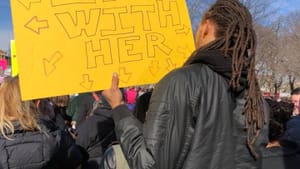Stay in the Loop
BSR publishes on a weekly schedule, with an email newsletter every Wednesday and Thursday morning. There’s no paywall, and subscribing is always free.
Beat yourself to the punch
That thing men call you in Philly: Part 2

My dad and I love one particular scene in the 1989 Lonesome Dove miniseries: author Larry McMurtry’s famous rangers, Augustus McCrae and Woodrow Call, stroll into a saloon and don’t like what they find.
Gus (Robert Duvall) orders a drink, but the bartender ignores him and complains about dusty cowboys. Gus quickly gets his chaps in a twist. He breaks the bartender’s nose, slugs a shot of whiskey, tosses the glass in the air, blasts it to bits, and then jabs his pistol into the bartender’s temple.
“Besides the whiskey, I think we’ll require a little respect,” he says. And he knocks the bleeding bartender unconscious with his gun.
Gus doesn’t put up with “dawdling service.”
It’s brutal and funny. Woodrow marvels that Gus isn’t arrested for his outburst. Gus answers, “It ain’t much of a crime, whacking a surly bartender.”
Mourning the Wild West
I thought of that scene when I texted my dad after publishing my recent column about that thing men call you in Philly. My dad, a former football and ice-hockey player, says it’s good that he lives in another state, because if he ever heard someone calling me a bitch, his response would land him in jail.
When I wrote that column, Dad said sometimes he wishes it was the 19th century and he could just body-slam the assholes through a poker table.
But not everyone feels the way my dad does. Readers have derided me in highly gendered terms as oversensitive, dismissed my experiences, and criticized me for unjustified or misdirected anger.
My BSR colleague Sarah Grey deemed some of the comments on my recent piece a demonstration of Lewis’s Law: “The comments on any article about feminism justify feminism.”
But I don’t dwell on those comments nearly as much as I dwell on a common response from men I know. For example, when I told a partner about the incident at the movie theater, he said the men were jerks; maybe karma would get them, and they’d get hit by a car.
But I don’t want anyone to get hit by a car. I just want to be treated like a human being.
“The best a man can get”
Men in my life who hear about the harassment I experience often say if that they were there, they would defend me. (Because harassment has never and will never happen when a man accompanies me, their valor, however earnest, remains hypothetical.)
Maybe they’re like the men in the razor commercial that went viral this week, as Gillette becomes the latest corporation to cash in on a social-justice movement. Repositioning its “the best a man can get” slogan as a #MeToo motto, the commercial stars quietly heroic men scattering bullies and interrupting catcallers.
A commercial that showed men canvassing for women representatives, voting for feminist candidates, reading feminist authors, calling their congressperson to advocate for maternal leave, donating to Women Organized Against Rape, and networking to bring more women to the board of directors wouldn’t be nearly as cinematic. Neither, I’m guessing, would it be palatable to a lot of men.
The cultural narrative Gillette has co-opted is correct. Individual actions disrupting or punishing harassment are heartwarming and necessary. (Disregard the cretins on Twitter smashing their razors in solidarity with toxic masculinity.) But do these actions address the systemic misogyny that makes harassment endemic in the first place — and not just the harassment itself, but those who tell women to stop whining when we bring it up?
Knocking heads versus feminism
It’s a good week to think about it, with the third annual Women’s March coming up. Alix Rosenfeld wrote a great essay about why participating in that event is complicated. But either way, the question of whether or not you’re willing to physically show up in solidarity with other people — especially in environments that don’t center you — is important.
If we’re being honest, the Gus McCrae model of battling disrespect (toward yourself or others) just leaves you knocking a lot of heads. As I told my dad: If you really do feel like punching a sexual harasser, you can do something 10 times more powerful any day of the week.
Vote for politicians who promote women’s healthcare access and equal pay. Read articles about combating misogyny — then share them. Give money to or volunteer for organizations that fight violence against women. Recruit qualified women and affirm them in your industry.
Treat all women — women of color, mothers, childfree women, partnered women, single women, fat women, women with disabilities, young women, older women, queer women, women experiencing poverty, immigrant women — with dignity. Support women’s rights and then call yourself what you are: a feminist.
And maybe one day, you won’t have to worry about defending us on the street.
Sign up for our newsletter
All of the week's new articles, all in one place. Sign up for the free weekly BSR newsletters, and don't miss a conversation.

 Alaina Johns
Alaina Johns